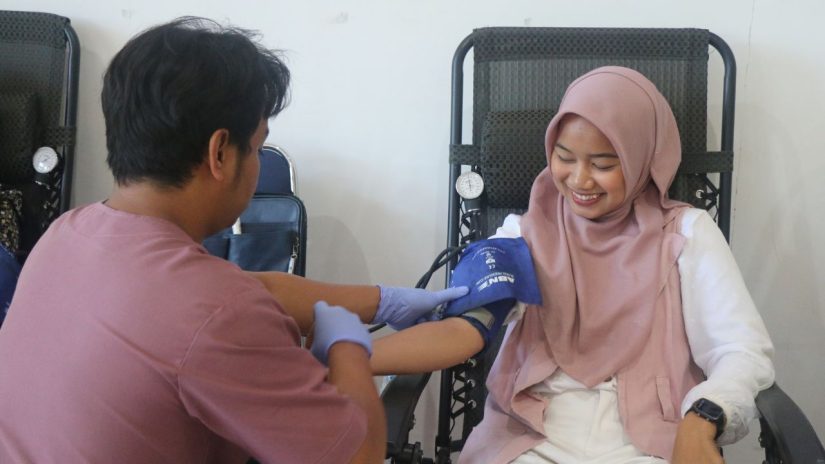
Johanes Koraag
Nowadays Indonesia is still experiencing a situation where there is still a gap between the national demand and availability of donated blood. Based on data from the 2022 PMI Central Blood Donor Unit Annual Report, the need for donated blood in 2022 is 5,515,476 bags of blood. Meanwhile, the blood that was collected from voluntary donors is as many as 3,796,698 bags of blood. The data shows that in 2022 Indonesia lacked 1,718,778 bags of blood. The insufficiency of blood needs certainly has an impact on patients who need these lifesaving blood donations.
A lack of blood supply can trigger several public health problems. For example, data from the Central Bureau of Statistics reported that the maternal mortality rate in Indonesia in 2022 reached 207 per 100,000 live births, exceeding the strategic plan target of 190 per 100,000 live births. Many mothers in labor who experience bleeding are not saved because of the unavailability of blood transfusions.
The first two precepts of Pancasila clearly show that for Indonesians a vertical relationship to God and a horizontal relationship to fellow humans are very important. In Islam, this principle is called Hablunn Minnallah and Hablunn Minannas. In Protestant and Catholic Christianity, this principle is the greatest commandment taught by Christ, which is to love the Lord your God with all your heart and love your neighbor as yourself. In Buddhism, this love is called metta, which is given the meaning of infinite love. The Dhamma of Buddhism is preached to all beings for the sake of happiness. In Hinduism, the concept of Tri Hita Karana teaches that love can be manifested in religious social interactions, namely between fellow humans (pawongan), between humans and the natural environment (palemahan), and between humans and God Almighty (parahyangan).
The presence of religions, whose core teachings are about love and kindness, should be a positive energy that encourages and moves its adherents to be actively involved in providing solutions to this problem of blood donations. Religious leaders are expected to motivate or teach people that donating a small portion of our blood to others who are suffering from illness and threatened with loss of life is a noble act that is priceless. To give blood is to give life, it is a gift that cannot be valued in material or monetary means because you are trying to save a life.
In response to the issue of blood donations and that religion can play an active role in providing answers to this problem, the Indonesian Consortium for Religious Studies (ICRS), a study program established by three universities, namely Gadjah Mada University, Sunan Kalijaga State Islamic University and Duta Wacana Christian University, took the initiative to carry out Community Service programs in the form of blood donation activities involving people from various religions. The activity was held on Friday, December 15, 2023, at the Gunung Kidul PMI Hall. This activity went well because of the support of technical personnel from the PMI Blood Donor Unit of Gunung Kidul Regency, as well as because of the mobilization of participants from various religious backgrounds carried out by the Gunung Kidul Religious Harmony Forum (Forum Kerukunan Umat Beragama / FKUB).
This interfaith blood donation activity began with remarks from H. Ngatemin, Vice Chair of FKUB Gunung Kidul, who said that blood donation activities are a humanitarian act that can unite mankind without discriminating against their religious backgrounds. Furthermore, Triyani Heny Astuti, MD, the Head of the Blood Unit of the Indonesian Red Cross (PMI/Palang Merah Indonesia) Gunung Kidul said that PMI Gunung Kidul had tried to involve religious people in the Gunung Kidul area as a way to meet the blood needs there. According to her, the response of religious people has been very good, but the participation rate needs to increase, especially in special situations such as during the fasting month of Ramadan, where there is always a decrease in the number of blood donors compared to ordinary days. The last speech was given by Dr. Leo Epafras from the ICRS study program, who emphasized that religion as a guide to life must be able to take a more active role in seeing the problem of the lack of donated blood. Religious leaders are expected to be able to put this issue in perspective following the teachings of each religion and to convey this message consistently to foster a culture of social care in each religion.
Within 2 hours this interfaith blood donation activity managed to collect 14 bags of blood from 25 participants present. Some participants were unsuccessful in donating blood for several health reasons, such as hemoglobin levels that were too low or too high, blood pressure that was not up to standard or due to taking medications. According to Triyani Heny Astuti, MD, being able to get 14 bags of blood within 2 hours was a very good result. She appreciated the implementation of this activity and she hopes that this can be an activity that is routinely carried out both in this location and in other areas of Yogyakarta.
